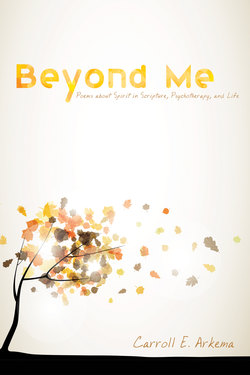Читать книгу Beyond Me - Carroll E. Arkema - Страница 6
На сайте Литреса книга снята с продажи.
Preface
ОглавлениеEver since I was a baby, I have heard the Bible read: by my father after every meal, by my mother at time for bed. Scripture feels like part of the fabric of my being, and its stories of the human condition, and of the relationships between God and human beings, resonate deeply with my personal and professional experiences of how people grow, resist growth, and can find deeper meaning, if they choose to, in an acknowledged relationship with God.
Poetry gives expression to all this in a way that’s vitally important to me. Much of scripture is poetry, of course, and even much of the prose has a poetic feel or metaphorical meaning which captures and unlocks the mysteries at the heart of existence.
My poems are not light fare, especially the long ones. They’re each a substantial meal, and therefore—as when eating satisfying and nutritious meals—it’s important to make time and space to get absorbed in them, whether partaking of them by oneself or sharing them with family or friends. Although they’re not light reading, I think that the poems have an energy that will carry you through to the end.
I wrote my first poem, “Panic,” over the course of five to six months as a less-than-fully-conscious part of my own healing journey. The first line came to me, and the rest began to follow. I felt more and more deeply soothed and satisfied as I worked on the poem. My panic abated, and I could now see my panic in a larger context. I felt that I was a part of something that was much bigger than me. The very writing of the poem, as well as its words, eventually put me in a healing and creative relationship with God—this awesome Presence which is beyond me and beyond any adequate apprehension or description of it. But words and stories about its manifestations remind us of its presence and of our ultimate dependence upon it. That Spirit-Presence is beyond me and within me—the very source of my life and breath. But if I don’t do my part to nurture this relationship, I increasingly experience darkness, panic, emptiness, void. However, when I’m mindful of my dependence upon that Transcendent Creative Energy or Spirit, I feel more alive, secure, and whole; and I can participate in some measure in that Creative Energy—by partnering with God’s healing Spirit in myself and others; by seeking justice; by finding ways of being creative myself—such as writing poetry, doing therapy.
The Journal of Religion and Health published that first poem, which was tremendously encouraging. I’ve been writing ever since, while continuing to be a Pastoral Psychotherapist and a Marriage and Family Therapist, and while continuing—with satisfaction and resistance—to pursue my own personal, relational, and spiritual growth.
In addition to being therapeutic for me, writing poetry allows me to explore the intricacy and complexity of existence—as captured also in Scripture—and gives me a framework for accessing sometimes detailed memories.
The poem “Death on the Farm and the Riddle of Samson” seeks to capture the remarkable story of Samson’s individuation journey—his movement towards becoming a mature intentional person. In the process, he rebels a bit as a way of defining himself in the context of the powerful expectations that his parents have of him and of what he knows about God and God’s plan for himself and the Israelites. In the end, when he’s stripped of all addictions and pride, he consciously chooses to align himself with God’s plan. He surrenders his life to God with far-reaching sacrificial effect, which frees himself and his people from bondage and oppression.
In writing “Kingdom of Heaven, Still at Hand?” I was struck by the relationship between John the Baptist and Jesus. Over the centuries, the focus on Jesus has all but eclipsed the significance for Jesus of John and his ministry. Notice specifically the mutual recognition and respect each has for the other. It became clear to me, as I wrote this poem, that the success and fulfillment of Jesus’ ministry is heavily indebted to John’s ministry: John’s humble ego-sacrificing relationship with Jesus, and also the example John gave of speaking divine truth to human power and arrogance—all the way to his death at their hands. He did indeed “prepare the way of the Lord.”
As for the poem about Benjy, based on a theatrical performance of sections from The Sound and the Fury by William Faulkner, well, Faulkner, wow, Faulkner! With a seamless artistry that leaves the Reader only noticing it later, he weaves into the novel a contemporary enactment of incarnation: of Transcendent Energy inhabiting someone who becomes a humble but authoritative mediator of a profoundly moving power that pierces to the marrow and leaves one knowing that even in suffering, one is inhabited by Spirit and not alone. I’m referring to the Preacher who—as he gets warmed up—shifts from academic theological language to colloquial African-American vernacular. Again, wow!
I experience and perceive these poems—at their best—as offering glimpses of Transcendent Mystery which is beyond us but also incarnate in human life and in all life on earth. I hope that the Reader resonates with some of what I’ve written, and catches yet another glimpse of the Mystery inherent in persons and in life and relationships.
Carroll E. Arkema
February 27, 2014
